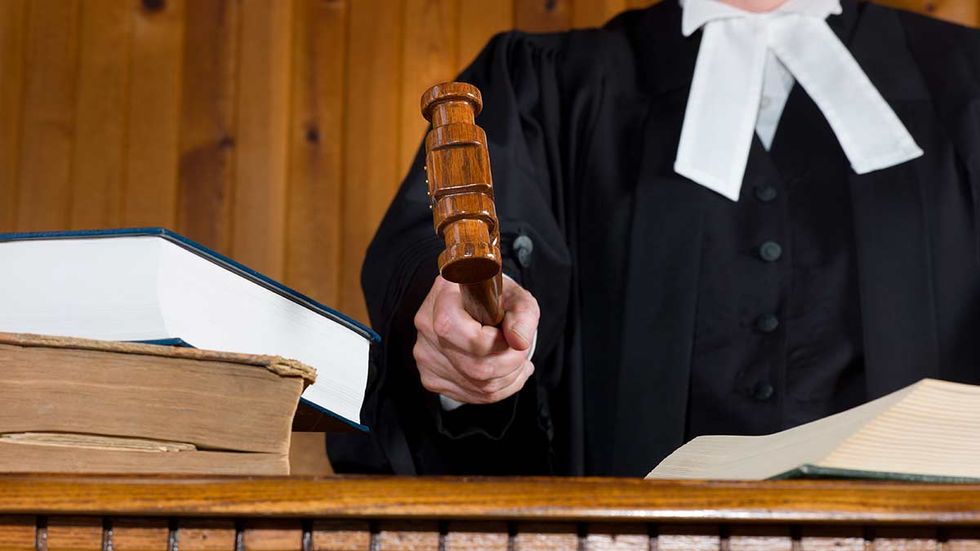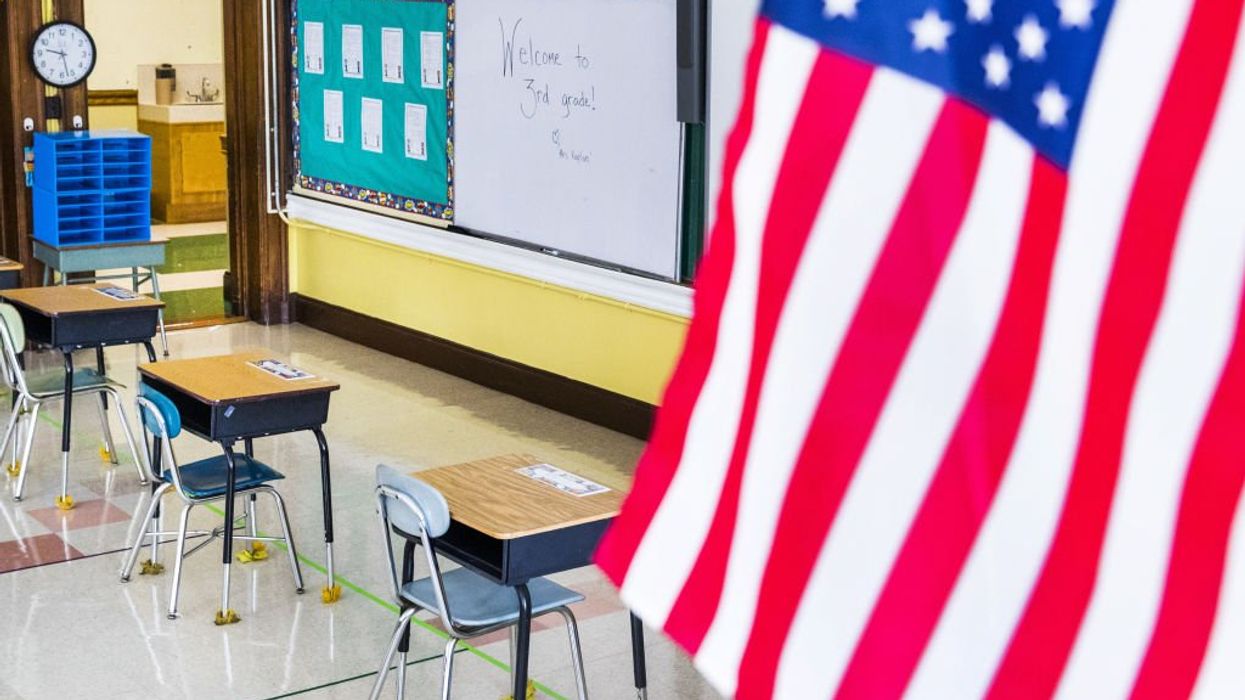
© 2024 Blaze Media LLC. All rights reserved.
The outcome of elections, like every other national question, is now determined by an assorted sample of unelected federal judges. So why even have elections? At this rate, we should just ask the judges to vote for us.
Courts exist to adjudicate cases under the law. For example, if two companies have a dispute or if I sue my neighbor for damaging my car, we go to court, not to Congress or a state legislature. But if we have a dispute over an issue that determines the outcome of the broadest public policy, cultural, and civic questions, we go to a legislature. That is what distinguishes us as a republic from a judicial version of North Korea. But now the judges are monopolizing the ultimate political question – election law. They are vitiating state law and determining the outcome of all elections – in favor of one party, of course.
What we are seeing in Georgia and Florida is Democrats using the liberal courts to mandate that states accept ballots that are either tardy or otherwise invalid pursuant to state law. Now a judge has ordered the recount in Florida to be extended. Who needs state governments when we have federal judges unilaterally vested with more power than all of Congress and the president put together?
States, not the federal courts, were given control over qualifications and process of elections
All elections must have standards. The Constitution leaves the decisions over the methods, process, and procedures of elections with the states. The structure of the ballots, the nature of the polling stations, the process of absentee ballots, standards governing unclear and anomalous ballots, and verification against fraud are all issues left to the states. The Election Clause (Art. I, §4, cl. 1) does give Congress, not the federal courts, power to intervene when necessary. According to Hamilton in Federalist No. 59, it was only to be in extraordinary circumstances, and it was primarily for the purpose of ensuring that elections are indeed held and Congress is not abolished altogether by the states.
Congress intervened in state election law during the 1860s to ensure that freed slaves weren’t denied the right to vote, and they passed other laws a century later to ensure that the states were complying with the Reconstruction-era constitutional amendments. Aside from those narrowly designed interventions, nothing fundamentally altered the control of states over election matters. Senator Jacob Howard, one of the prime drafters of the 14th Amendment, made it clear during the floor debate in 1866: “The second section leaves the right to regulate the elective franchise still with the States, and does not meddle with that right.”
As Justice Thomas said in Evenwel v. Abbott, “None of the Reconstruction Amendments changed the original understanding of republican government.” And that original understanding as it relates to election law was that states should control the methods and procedures of elections because “it was found necessary to leave the regulation of [federal elections], in the first place, to the state governments, as being best acquainted with the situation of the people,” as Madison said at the Virginian Ratifying Convention.
Thus, we are left, more or less, with the original constitutional design from Art. I §2 and the 17th Amendment – that states control the qualifications of the electors of the electoral college and those who can vote in congressional elections. As Justice Thomas said in Arizona v. The Inter Tribal Council of Arizona, Inc., “It was well understood that congressional power to regulate the “Manner” of elections under Article I, §4, did not include the power to override state voter qualifications under Article I, §2.”
The courts crown themselves king over elections
Over time, Congress did need to ensure that the narrow Reconstruction-era amendments were enforced. The Voting Rights Act of 1965 was designed to combat real discrimination against black American voters during the Jim Crow days of the South. Yet much like the 14th Amendment and other civil rights-era legislation (both in the 19th and 20th centuries), the Left and the courts are twisting the interpretation of the VRA to crush the states. Beginning with the Baker v. Carr decision and in many subsequent decisions, the federal courts have taken over election law from Congress. Even though Art. I §4 gives Congress the power to police the states and even though §5 of the 14th Amendment gives Congress the power to enforce the Reconstruction-era Amendments, the courts always read the word “judiciary” in place of “Congress.”
Many observers thought that the 2013 Shelby County case, wherein the court struck down one provision of the Voting Rights Act, would lead to an era of states having more control over election law. Quite the contrary — it has led to successful lawsuits striking down every aspect of state law. We’ve seen the courts in recent months nullify every Republican redistricting map; mandate weeks of early voting; prevent states from asking for photo ID at the polls or verifying proof of citizenship for voter registration; block states from combatting voter fraud; block states from cleaning dirty voter rolls; and generally require the implementation of any administrative method or procedure of voting that is preferred by Democrats.
The Supreme Court has failed to police these lower courts. Adding insult to injury, the other two branches of government as well as our entire body politic believe any random federal judge can control and vitiate commonsense state election law.
In short, the courts — at the behest of the ACLU — have abused the VRA to ensure that Republicans can never win a close election because they require laws that both favor Democrat GOTV over Republicans and prevent states from combatting voter fraud. Hence, a law that was designed to stop the disenfranchisement of black voters is now used to disenfranchise all citizens — black and white — by invalidating voter ID laws and other measures designed to screen out non-citizen voters and voter fraud.
The notion that the federal government could get involved in the number of days of voter registration and voter qualification issues would have been foreign to our Founders. Even if we defend the continuation of the Voting Rights Act’s interventions because they were needed decades ago to stop Jim Crow laws, it is simply against the spirit of the Constitution for the courts to apply those laws beyond their original intent.
Yet here we are, with the courts vitiating one election law after another to tip the balance of power to Democrats. What they do is create an insurance policy by deliberately getting fraudulent voters, ineligible voters, voters without the proper residency and documentation, erroneously gathered absentee ballots, and even non-citizens to cast provisional ballots up front. Federal law does require states to offer provisional ballots, but states were left to determine the regulations and specific application. That is, until the courts came in and started mandating who must be accepted and under which circumstances.
Consequently, Democrats accrue piles of thousands of ineligible voters throughout an election with absentee ballots and on Election Day with provisional ballots. As soon as they see the results within striking distance, they get a federal judge to mandate the counting of those votes. We are living through an electoral trend of increasingly close races with a polarized country, and unless this judicial supremacy is mitigated, Republicans will lose every important election because of the breakdown of the rule of law and uniform and fraud-proof standards.
Nobody put it better than Marco Rubio:
And indeed, if we are prepared to vest the power of determining the score in the unelected branch of government, we are left with nothing but a judicial North Korea.
#mc_embed_signup{background:#fff; clear:left; font:14px}
/* Add your own MailChimp form style overrides in your site stylesheet or in this style block.
We recommend moving this block and the preceding CSS link to the HEAD of your HTML file. */
Want to leave a tip?
We answer to you. Help keep our content free of advertisers and big tech censorship by leaving a tip today.
Want to join the conversation?
Already a subscriber?
Blaze Podcast Host
Daniel Horowitz is the host of “Conservative Review with Daniel Horowitz” and a senior editor for Blaze News.
RMConservative
Daniel Horowitz
Blaze Podcast Host
Daniel Horowitz is the host of “Conservative Review with Daniel Horowitz” and a senior editor for Blaze News.
@RMConservative →more stories
Sign up for the Blaze newsletter
By signing up, you agree to our Privacy Policy and Terms of Use, and agree to receive content that may sometimes include advertisements. You may opt out at any time.
© 2024 Blaze Media LLC. All rights reserved.
Get the stories that matter most delivered directly to your inbox.
By signing up, you agree to our Privacy Policy and Terms of Use, and agree to receive content that may sometimes include advertisements. You may opt out at any time.



